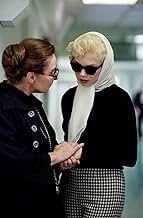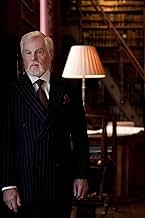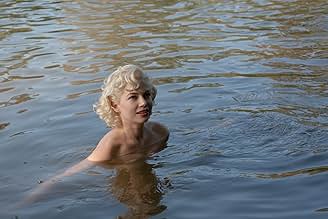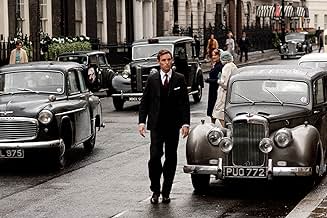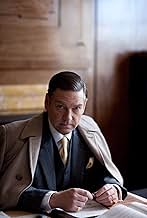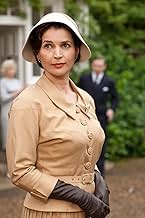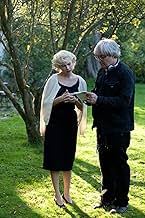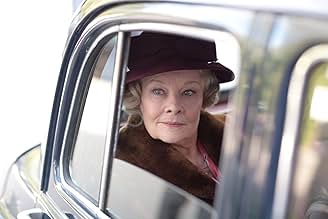CALIFICACIÓN DE IMDb
6.9/10
91 k
TU CALIFICACIÓN
Colin Clark, un empleado de Sir Laurence Olivier, documenta la tensa interacción entre Olivier y Marilyn Monroe durante la producción de El príncipe y la corista (1957).Colin Clark, un empleado de Sir Laurence Olivier, documenta la tensa interacción entre Olivier y Marilyn Monroe durante la producción de El príncipe y la corista (1957).Colin Clark, un empleado de Sir Laurence Olivier, documenta la tensa interacción entre Olivier y Marilyn Monroe durante la producción de El príncipe y la corista (1957).
- Dirección
- Guionistas
- Elenco
- Nominado a 2 premios Óscar
- 18 premios ganados y 64 nominaciones en total
- Dirección
- Guionistas
- Todo el elenco y el equipo
- Producción, taquilla y más en IMDbPro
Opiniones destacadas
'My Week With Marilyn' had much going for it, considering the cast pedigree and the subject. It is always hard making biographical dramas of actresses known for their beauty or portraying the actresses themselves, as evidenced by the wildly variable executions of how well they come off or not.
Whether it is a completely truthful account of Marilyn Monroe's life at this chapter of her life or not was never going to cloud my judgement of how to rate and review 'My Week With Marilyn'. What mattered much more was how the film fared on its own two feet, and 'My Week With Marilyn' fares mostly very well and is beguiling stuff. Not one of the greatest biopics ever made (in a list that includes 'Amadeus' and 'The Elephant Man') but generally of the portrayals of actresses known for their classic beauty it's one of the better-faring ones.
By all means, there are flaws. The direction can be rather blandly workmanlike and there is too much of a heavy-footed feel that jars with the lightness of the material itself. The film has a tendency to drag in the more intimate scenes with Monroe and Clark, which does suffer from occasional disjointed-ness, some trite moments and lack of chemistry at times.
Julia Ormond is also badly miscast as Vivien Leigh, it is a very phoned in and indifferent performance that anybody not familiar with the actress herself but is aware of her reputation will question her appeal, she is also somewhat too healthy-looking (but also not beautiful enough) for a woman plagued with physical and mental health problems in her later years. To a lesser extent, Dominic Cooper struck me as too young and doesn't have much to do to really register.
However, 'My Week With Marilyn' looks wonderful. The production and costume design were among the most visually exquisite and evocatively designed of that year, the period is perfectly evoked that it's like you've been transported back in time and are actually there and it's a beautifully shot film (not as incredible of that for 'The Tree of Life' and 'Hugo' but close). The soundtrack brilliantly and beautifully captures the mood of the film, it's sensitively composed without being too low-key and never intrusive or too made for television. It's also evocative of the period.
Not everything in the script works, there are some trite and disjointed parts but they are far outweighed by the very thought-provoking, funny and sincere ones, it's fluff but very charming fluff. The storytelling drags occasionally, but is also very entertaining and heartfelt with the scenes with Monroe and Laurence Olivier being particularly intriguing and well done.
Ormond aside, the acting is very good. Michelle Williams allures and completely captivates as Monroe herself, blending a sultriness, childlike lust and a darker and more destructive nature seamlessly. She matched by Kenneth Branagh's spot-on Olivier, being hilarious, sympathetic and believable in his exasperation, Judi Dench's splendid Dame Sybil and Zoe Wanamaker's gleefully scene-stealing and wonderfully stern turn. Dougray Scott has been criticised by some, personally had little problem with him, and there is much more of a resemblance to him as Arthur Miller than Ormond as Leigh, other than his American accent being overdone.
Eddie Redmayne gives a very sensitive portrayal in a role deliberately not written as interestingly as the rest, as, despite being the film's heart, he is not the film's focus and was never intended to be as meaty as Monroe or Olivier.
On the most part, 'My Week With Marilyn' was very worthwhile and beguiling. Well worth the time, as long as watched as a film on its own two feet and not as a history lesson. 7/10 Bethany Cox
Whether it is a completely truthful account of Marilyn Monroe's life at this chapter of her life or not was never going to cloud my judgement of how to rate and review 'My Week With Marilyn'. What mattered much more was how the film fared on its own two feet, and 'My Week With Marilyn' fares mostly very well and is beguiling stuff. Not one of the greatest biopics ever made (in a list that includes 'Amadeus' and 'The Elephant Man') but generally of the portrayals of actresses known for their classic beauty it's one of the better-faring ones.
By all means, there are flaws. The direction can be rather blandly workmanlike and there is too much of a heavy-footed feel that jars with the lightness of the material itself. The film has a tendency to drag in the more intimate scenes with Monroe and Clark, which does suffer from occasional disjointed-ness, some trite moments and lack of chemistry at times.
Julia Ormond is also badly miscast as Vivien Leigh, it is a very phoned in and indifferent performance that anybody not familiar with the actress herself but is aware of her reputation will question her appeal, she is also somewhat too healthy-looking (but also not beautiful enough) for a woman plagued with physical and mental health problems in her later years. To a lesser extent, Dominic Cooper struck me as too young and doesn't have much to do to really register.
However, 'My Week With Marilyn' looks wonderful. The production and costume design were among the most visually exquisite and evocatively designed of that year, the period is perfectly evoked that it's like you've been transported back in time and are actually there and it's a beautifully shot film (not as incredible of that for 'The Tree of Life' and 'Hugo' but close). The soundtrack brilliantly and beautifully captures the mood of the film, it's sensitively composed without being too low-key and never intrusive or too made for television. It's also evocative of the period.
Not everything in the script works, there are some trite and disjointed parts but they are far outweighed by the very thought-provoking, funny and sincere ones, it's fluff but very charming fluff. The storytelling drags occasionally, but is also very entertaining and heartfelt with the scenes with Monroe and Laurence Olivier being particularly intriguing and well done.
Ormond aside, the acting is very good. Michelle Williams allures and completely captivates as Monroe herself, blending a sultriness, childlike lust and a darker and more destructive nature seamlessly. She matched by Kenneth Branagh's spot-on Olivier, being hilarious, sympathetic and believable in his exasperation, Judi Dench's splendid Dame Sybil and Zoe Wanamaker's gleefully scene-stealing and wonderfully stern turn. Dougray Scott has been criticised by some, personally had little problem with him, and there is much more of a resemblance to him as Arthur Miller than Ormond as Leigh, other than his American accent being overdone.
Eddie Redmayne gives a very sensitive portrayal in a role deliberately not written as interestingly as the rest, as, despite being the film's heart, he is not the film's focus and was never intended to be as meaty as Monroe or Olivier.
On the most part, 'My Week With Marilyn' was very worthwhile and beguiling. Well worth the time, as long as watched as a film on its own two feet and not as a history lesson. 7/10 Bethany Cox
Marilyn Monroe, the quintessential blonde bombshell, came to Pinewood Studios in 1956 to shoot 'The Prince and the Showgirl', a light comedy directed by and starring Laurence Olivier. Colin Clark, the third assistant director on the film, was the lucky 23-year-old who got to spend a week with her. 'My Week with Marilyn' cinematises his diary.
I imagine there aren't many characters more difficult to play than Monroe. It must be like playing Elvis. But I'm delighted to confirm that Michelle Williams makes the impossible look easy. She has thrown herself into this part and has nailed the portrayal. Aside from the physical resemblance, Williams walks, talks and acts like Monroe. It's too early to say whether she'll win the Oscar next year, but a nomination seems a certainty.
Williams' performance is bolstered by impeccable turns by an enviable roster of the creamiest cream of British talent: Judi Dench, Kenneth Branagh, Zoë Wanamaker, Eddie Redmayne and Emma Watson. Especial mention must go to Branagh whose Olivier is impeccable. He accurately displays the legendary actor's sophistication and scurrility, and is bound to receive a supporting Oscar nod.
I loved the film's playfulness, for instance when Clark takes Monroe on a tour of Eton, followed by skinny-dipping in a cold river. The filmmakers do well to capture the craziness of Marilyn's world and the feeling of what it was like to be the most famous woman in the world. There are some lovely little touches – like the scene where Clark asks Monroe why she has a picture of Abe Lincoln by her bedside. Her reply, 'I don't know who my real father was, so why not him?'.
Eddie Redmayne, who has appeared in some big films ('The Good Shepherd', 'Elizabeth: The Golden Age') is well-cast as Colin Clark. Perhaps it's because he looks so much the underdog. He sort of represents every young man who would have killed to be in his shoes.
Clark has his eyes set on Monroe but resigns himself to the fact that Emma Watson's character, a costume assistant, is more his match. A weakness in the story, although I'm unclear of the veracity, is how underused Watson is and how readily she forgives his liaison with Monroe. Didn't girls have higher standards in those days?
Simon Curtis is yet another Englishman who has moved seamlessly from TV to cinema. His film astutely plays down the fact that Colin was brother to the even more famous Alan Clark, a former Conservative MP. Rightly so, I think. This film isn't about the minister or his also-famous diaries.
I'm glad the filmmakers didn't sacrifice the film's integrity by moulding it to be rated 12A (British certificate) to increase ticket sales. The two or three flashes of flesh are not only welcome, they are vital (Monroe said that 'the body is meant to be seen'). Curtis teases us like Marilyn was famous for doing. But he knows not to go too far by showing us any more than is necessary.
In summary, this is a brilliant biopic, as well as a story of what happened when a young man got close to the star he adored. It is bittersweet and evocative of a golden age of Hollywood. I was made to care for Monroe. I felt bad for her when she was exploited. Along with Elton John's beautiful song, this film has made me understand Norma Jeane Mortenson a little better. Now I see her as more than a sex symbol. She may have been blonde but she wasn't dumb. Dumb blondes don't read James Joyce or marry Arthur Miller, or come out with some of the wittiest lines a person can utter. She was like all of us, really: a human being.
www.moseleyb13.com
I imagine there aren't many characters more difficult to play than Monroe. It must be like playing Elvis. But I'm delighted to confirm that Michelle Williams makes the impossible look easy. She has thrown herself into this part and has nailed the portrayal. Aside from the physical resemblance, Williams walks, talks and acts like Monroe. It's too early to say whether she'll win the Oscar next year, but a nomination seems a certainty.
Williams' performance is bolstered by impeccable turns by an enviable roster of the creamiest cream of British talent: Judi Dench, Kenneth Branagh, Zoë Wanamaker, Eddie Redmayne and Emma Watson. Especial mention must go to Branagh whose Olivier is impeccable. He accurately displays the legendary actor's sophistication and scurrility, and is bound to receive a supporting Oscar nod.
I loved the film's playfulness, for instance when Clark takes Monroe on a tour of Eton, followed by skinny-dipping in a cold river. The filmmakers do well to capture the craziness of Marilyn's world and the feeling of what it was like to be the most famous woman in the world. There are some lovely little touches – like the scene where Clark asks Monroe why she has a picture of Abe Lincoln by her bedside. Her reply, 'I don't know who my real father was, so why not him?'.
Eddie Redmayne, who has appeared in some big films ('The Good Shepherd', 'Elizabeth: The Golden Age') is well-cast as Colin Clark. Perhaps it's because he looks so much the underdog. He sort of represents every young man who would have killed to be in his shoes.
Clark has his eyes set on Monroe but resigns himself to the fact that Emma Watson's character, a costume assistant, is more his match. A weakness in the story, although I'm unclear of the veracity, is how underused Watson is and how readily she forgives his liaison with Monroe. Didn't girls have higher standards in those days?
Simon Curtis is yet another Englishman who has moved seamlessly from TV to cinema. His film astutely plays down the fact that Colin was brother to the even more famous Alan Clark, a former Conservative MP. Rightly so, I think. This film isn't about the minister or his also-famous diaries.
I'm glad the filmmakers didn't sacrifice the film's integrity by moulding it to be rated 12A (British certificate) to increase ticket sales. The two or three flashes of flesh are not only welcome, they are vital (Monroe said that 'the body is meant to be seen'). Curtis teases us like Marilyn was famous for doing. But he knows not to go too far by showing us any more than is necessary.
In summary, this is a brilliant biopic, as well as a story of what happened when a young man got close to the star he adored. It is bittersweet and evocative of a golden age of Hollywood. I was made to care for Monroe. I felt bad for her when she was exploited. Along with Elton John's beautiful song, this film has made me understand Norma Jeane Mortenson a little better. Now I see her as more than a sex symbol. She may have been blonde but she wasn't dumb. Dumb blondes don't read James Joyce or marry Arthur Miller, or come out with some of the wittiest lines a person can utter. She was like all of us, really: a human being.
www.moseleyb13.com
I liked this movie, it was a non-judgemental re-telling of a slice of history. I thought the performances were all very good by the leading characters. I have no idea what the real Marilyn was like and I don't think many people do, but Michelle Williams character is a more than plausible interpretation, vulnerable at times, manipulative at others, who really knows where the reality lies, but there was something for everyone's interpretation. The movie did a good job of depicting that moment in time and transporting the audience there for a couple of hours. I guess it is every man's fantasy to have this opportunity, so the story is a satisfying one for any man who has ever wondered what the real Marilyn may have been like.
Here's the thing: knowing this is going to be about Marilyn, we expect certain things. Dazzling beauty exuding sex, insecure film star in search of the real person; perhaps some eye-popping excess about the business responsible for fabricating our dreams. And we expect these because Marilyn's story is Hollywood lore at its most pure: a pretty picture masking darkness of all sorts.
So because we already know that Marily was not just a sparkling movie star and because this is all so widely familiar and with its own widely referenced myth and iconography, the only reason to make this into a film is that you have come up with some unique angle that sheds new unexpected light into the thing. A structure that can hold together so many cinematic dreams implicit by having at the center this woman who gave flesh to them.
At least the premise is sound, if not remarkable. A young man has written a book about his short time together with her, and on a movie set. We trust that a lot of that is fictional and doctored, itself not far from a movie script. Ideally, our film has the option of conflating personal recollection, diary, rehearsal, film being made, into our film about the fabrication of myths and an actress looking to understand the real person behind the role she's given to play.
The first half holds. A breezy, sparkling, leisurely stroll around a movie set, as we like to imagine must have been everyday life around movie stars. We bask in the radiance of making movies and play-acting. What better life?
In the second half however we expect to know the other side of the idealized image. Sex as no longer delicious eye-candy but baring the soul naked.
What do we get instead? That same stereotyped image attached to a score of movie clichés: tabloid proclamations, banality, hackneyed emotion diffused into TV soap. We know that Marilyn and this world was more complex than this. Gentlemen preferred the blonde for a reason and the film does not even begin to understand why.
So because we already know that Marily was not just a sparkling movie star and because this is all so widely familiar and with its own widely referenced myth and iconography, the only reason to make this into a film is that you have come up with some unique angle that sheds new unexpected light into the thing. A structure that can hold together so many cinematic dreams implicit by having at the center this woman who gave flesh to them.
At least the premise is sound, if not remarkable. A young man has written a book about his short time together with her, and on a movie set. We trust that a lot of that is fictional and doctored, itself not far from a movie script. Ideally, our film has the option of conflating personal recollection, diary, rehearsal, film being made, into our film about the fabrication of myths and an actress looking to understand the real person behind the role she's given to play.
The first half holds. A breezy, sparkling, leisurely stroll around a movie set, as we like to imagine must have been everyday life around movie stars. We bask in the radiance of making movies and play-acting. What better life?
In the second half however we expect to know the other side of the idealized image. Sex as no longer delicious eye-candy but baring the soul naked.
What do we get instead? That same stereotyped image attached to a score of movie clichés: tabloid proclamations, banality, hackneyed emotion diffused into TV soap. We know that Marilyn and this world was more complex than this. Gentlemen preferred the blonde for a reason and the film does not even begin to understand why.
"My Week with Marilyn" is entertaining and sufficiently well done to interest anyone who remembers her story. But those who have some exposure to the literature she has generated should be impressed by the way the film manages to represent so many of the very different views there are about her. Was she a smart, predatory woman in control of her persona and milking it for all she could get? The sad addicted victim of her handlers? An ordinary woman looking for love and happiness derailed by her own star quality? The movie represents all of these views and refuses to settle the question. The writer and director are to be congratulated for resisting the temptation to come down on a particular view.
¿Sabías que…?
- TriviaAccording to executive producer and director Simon Curtis on his DVD commentary, Dame Judi Dench was unavailable for the principal photography period, and her parts had to be filmed about two weeks before the rest of the production. Throughout the movie, Dench and Michelle Williams are never seen in the same shot, including one in which Dench shakes hands with (seemingly) Williams' hand being extended from off-screen. Adam Recht's deft editing gives the illusion that Williams and Dench were being filmed at the same time.
- ErroresA frustrated Olivier tells Colin that he should have cast Vivien to play Elsie instead of Marilyn. Marilyn bought the rights to "The Sleeping Prince" from its author Terence Rattigan, and hired Olivier, who agreed to co-produce the film, to direct; she could not be replaced.
- Citas
Marilyn Monroe: Little girls should be told how pretty they are. They should grow up knowing how much their mother loves them.
- ConexionesFeatured in Maltin on Movies: The Muppets (2011)
- Bandas sonorasWhen Love Goes Wrong (Nothin' Goes Right)
Written by Harold Adamson and Hoagy Carmichael
Performed by Michelle Williams
Published by EMI First Catalog Inc., Peer Music (UK) Ltd (c/o Songs of Peer Ltd)
Courtesy of The Weinstein Company
Arranged and Produced by David Krane
Selecciones populares
Inicia sesión para calificar y agrega a la lista de videos para obtener recomendaciones personalizadas
Detalles
- Fecha de lanzamiento
- Países de origen
- Idiomas
- También se conoce como
- My Week with Marilyn
- Locaciones de filmación
- Hatfield House, Melon Ground, Hatfield Park, Hatfield, Hertfordshire, Inglaterra, Reino Unido(Windsor Castle - interiors)
- Productoras
- Ver más créditos de la compañía en IMDbPro
Taquilla
- Presupuesto
- GBP 6,400,000 (estimado)
- Total en EE. UU. y Canadá
- USD 14,600,347
- Fin de semana de estreno en EE. UU. y Canadá
- USD 1,750,507
- 27 nov 2011
- Total a nivel mundial
- USD 35,057,696
- Tiempo de ejecución1 hora 39 minutos
- Color
- Mezcla de sonido
- Relación de aspecto
- 2.35 : 1
Contribuir a esta página
Sugiere una edición o agrega el contenido que falta







